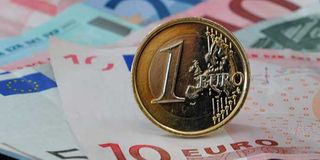Why a successful Eurobond should ease pressure on the Kenya shilling

A picture taken on December 15, 2011 in Lille, France, shows a one-Euro coin and banknotes of 5, 10, and 20. AFP PHOTO PHILIPPE HUGUEN
What you need to know:
- In a sense, we are graduating from relying on donor aid, short-term loans from syndicates of foreign banks, and tied aid from China
- The advantage of capital markets is that it makes the terms of borrowing and repayment a public issue: The information will be out there in charts and screens displayed for everybody with access to a computer or smartphone.
- Many still remember when bondholders seized an Argentine naval ship in Ghana in April, 2012, citing long unpaid bonds.
I have received several requests from the readers of this column to explain what a Eurobond is and whether the fact that Kenya is floating a bond in the international market is, indeed, a big deal.
Put simply, a bond is a piece of paper, more or less an IOU, which you buy from the government or any other issuer on the understanding that the issuer will pay you with interest within a specific period.
Every week, the government comes to the market to sell new issues of Treasury bills and bonds to raise money to fund the budget. Bonds and bills supplement what has been raised from taxes.
In our market, the biggest buyers of these pieces of paper are commercial banks, pension funds, insurance companies, and high-net worth individuals.
In the past, Treasury bills and bonds were actual pieces of paper, hence the term government paper. However, in the digital age that we live in today, the value is reflected in digital accounts.
What then is a Eurobond? The only difference between a Eurobond and local Treasury bills and bonds is that instead of offering the paper here and in Kenya shillings, the floatation is going to happen in the Euromarket, where the purchasers will pay in US dollars.
I will stop there as I do not want to be accused of engaging in pedagogy and oversimplification.
MORE FLEXIBLE REPAYMENT
The readers of this column will recall that in 2012, we went to the international market to borrow a two-year $600 million loan from a syndicate of commercial banks to fund the 2013 elections.
Instead of borrowing directly from foreign banks, we are now issuing a bond. Bonds give you longer and more flexible repayment terms.
In a sense, we are graduating from relying on donor aid, short-term loans from syndicates of foreign banks, and tied aid from China to borrowing from one of the largest and most liquid capital markets in the world.
Capital markets do not give onerous conditions. They will just look at your ratings, determine whether you are able to pay, and tell you how much they are willing to pay for your bond.
In terms of transparency, a Eurobond makes a great deal of sense.
The other day, we borrowed billions of dollars from Exim Bank of China to build the proposed standard gauge railway line from Mombasa to Nairobi. Unless you are one of the few individuals with access to loan contracts, you would not know the finer details of the loan by the Chinese bank.
The advantage of capital markets is that the terms of borrowing and repayment are a public issue: The information will be out there in charts and screens displayed for everybody with access to a computer or smartphone.
I gather that the government delegation going for the Eurobond road show will be leaving the country this week. The show will start from the west coast of the United States — in Los Angeles and San Francisco — to the east coast — New York — and end up in London.
CAPITAL "MARKETS UNFORGIVING"
Indeed, depending on the success of the Eurobond, Kenya will have exposed itself to a totally new regime of discipline in terms of debt repayment.
The agreement the government will be signing provides for extraordinary meetings of bondholders to discuss material issues likely to affect prompt repayment.
International capital markets are very unforgiving. Many still remember when bondholders seized an Argentine naval ship in Ghana in April, 2012, citing long unpaid bonds.
Still, we wait to see the anxiety and anticipation within the domestic capital and money markets for the Eurobond.
When the government borrows less from the local market, short-term interest rates go down while rates on fixed income securities go up. And with dollars from the Eurobond beginning to flow, the pressure on the exchange rate is expected to ease.
With the cost of credit going down in tandem with the fall in interest rates, and companies paying less in financing charges, they will pay better dividends. That expectation of better dividends will push equity prices upwards.
Players, especially dealers in fixed income securities, must be scratching their heads, calculating how to take advantage of the market conditions the Eurobond is likely to bring.





